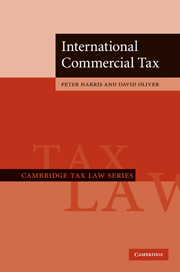Book contents
- Frontmatter
- Contents
- Preface
- List of abbreviations
- Table of Cases
- Table of statutes
- Table of treaties
- Introduction
- 1 Fundamentals and sources of international tax law
- 2 The jurisdiction to tax
- 3 Source country taxation
- 4 Residence country taxation
- 5 The limited scope of treaties
- 6 Changes of source and residence
- 7 Bilateral administrative issues
- Conclusion
- References
- Index
Conclusion
Published online by Cambridge University Press: 03 May 2011
- Frontmatter
- Contents
- Preface
- List of abbreviations
- Table of Cases
- Table of statutes
- Table of treaties
- Introduction
- 1 Fundamentals and sources of international tax law
- 2 The jurisdiction to tax
- 3 Source country taxation
- 4 Residence country taxation
- 5 The limited scope of treaties
- 6 Changes of source and residence
- 7 Bilateral administrative issues
- Conclusion
- References
- Index
Summary
This book has set about identifying, explaining, categorising and analysing, at a basic level, the rules that govern income taxation of international commercial transactions. The lasting impression is one of various sets of overlaying, largely uncoordinated and complex measures that deal with some matters (not necessarily the most important) better than others. The messy structure, if it can be called that, appears to be crumbling under the pressures of globalisation. Of course, none of the independent measures that form the basis of the international tax ‘system’ was designed to deal with a world as highly integrated as the one in which they are currently being used.
While interested parties, such as the OECD, have valiantly strived to adapt the existing system to a modern environment, they are trying to use a system designed for gas valve technology to regulate twenty-first century computer generated transactions. As noted at the start of Chapter 5, it seems inevitable that the old system of bilateral tax treaties will be abandoned at some point this century. The question and major challenge is whether that system will be abandoned in favour of an intentionally structured system designed to best deal with modern situations or whether the new system will develop as a set of ad hoc rules with a loose attempt at coordination.
At present, we are set on the latter course. Countries are crumbling under the weight of their ever-expanding tax laws.
- Type
- Chapter
- Information
- International Commercial Tax , pp. 467 - 469Publisher: Cambridge University PressPrint publication year: 2010

